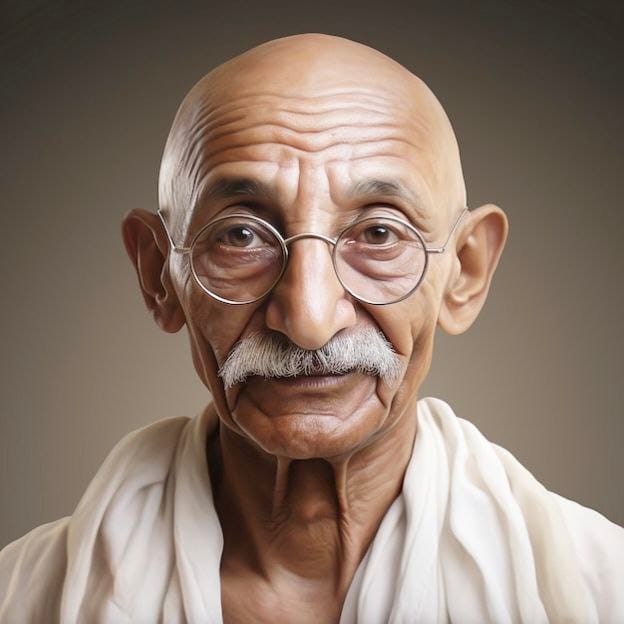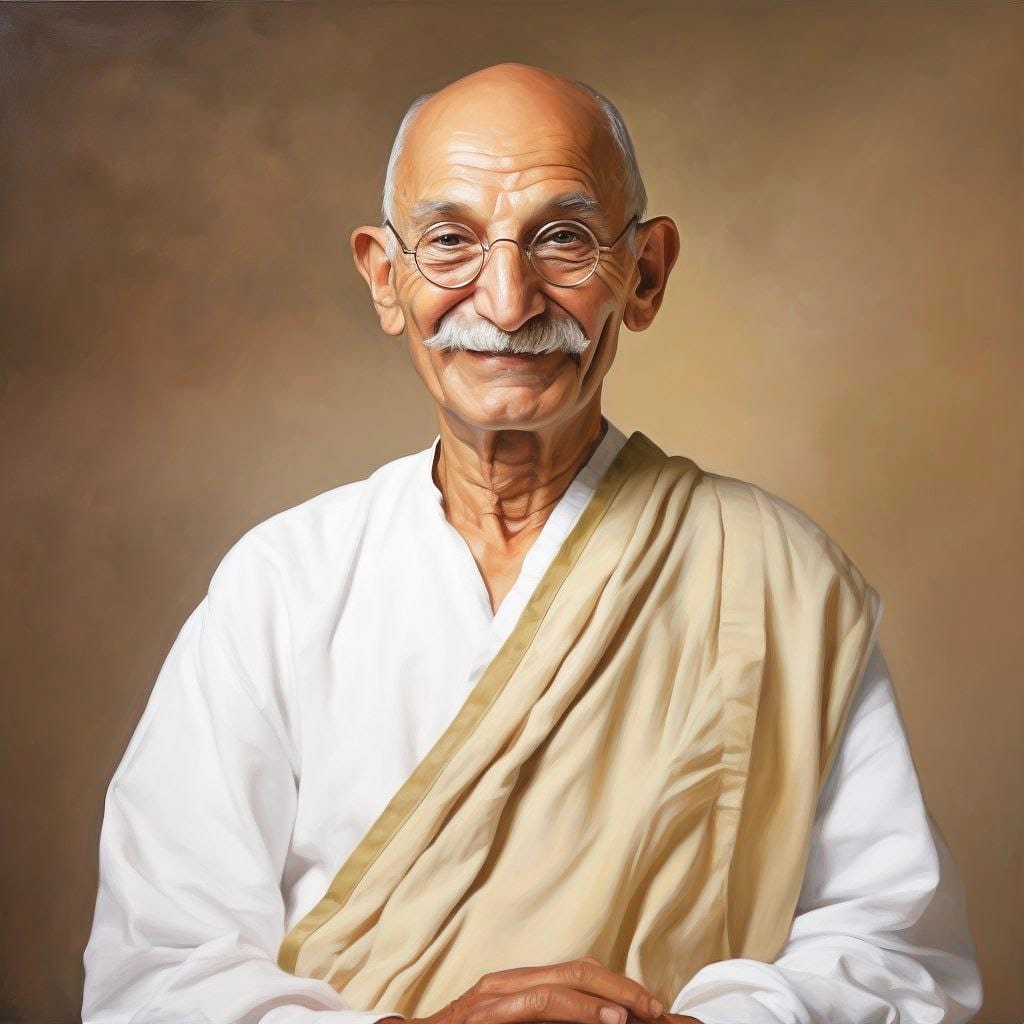To create a seminar project on the Relevance of Gandhi in the Contemporary World (21st Century), you can organize it into key themes that highlight how Gandhi’s philosophies apply to modern issues. Here’s a suggested structure for your project:
1. Title of the Seminar Project
- “Gandhi’s Legacy in the 21st Century: Relevance of His Ideas in Today’s World”
2. Introduction
- Objective: Explain why it is important to revisit Gandhi’s ideas today. You could begin by highlighting the challenges of the 21st century—violence, inequality, environmental degradation, political unrest, and moral crises—and frame Gandhi’s principles as a timeless solution to these challenges.
- Background: Provide a brief introduction to Mahatma Gandhi’s life, key philosophies (nonviolence, truth, simple living, etc.), and his contributions to the Indian independence movement and global peace efforts.

3. Key Themes (Main Body)
Each theme should focus on a particular Gandhian principle and how it applies to contemporary issues. Include examples from today’s world where Gandhi’s ideas are making a difference or could be applied to solve current challenges.
a. Nonviolence (Ahimsa) and Global Peacebuilding
- Discuss Gandhi’s principle of ahimsa and its relevance in addressing global conflicts, terrorism, and violent political movements.
- Case studies: Nonviolent movements in the 21st century such as the Arab Spring, Black Lives Matter, or Hong Kong’s pro-democracy protests.
- Connect to contemporary peacebuilding efforts and the role of nonviolence in diplomacy, conflict resolution, and international relations.
b. Satyagraha (Truth and Civil Disobedience)
- Explore the role of satyagraha (truth-force) in today’s world where misinformation and propaganda dominate.
- Modern examples of nonviolent resistance: Movements fighting for transparency, accountability, and social justice. Think of whistleblowers (e.g., Edward Snowden, Julian Assange) or civil disobedience movements like the Extinction Rebellion.
- Discuss how Gandhi’s concept of truth and moral resistance can guide modern protests and activism for ethical governance.
c. Sustainability and Environmentalism
- Highlight Gandhi’s focus on simplicity, minimalism, and self-reliance (swadeshi), and how it aligns with modern sustainability efforts.
- Case studies: Global movements toward sustainability like the zero-waste movement, climate activism (e.g., Greta Thunberg’s campaign), or rural development projects emphasizing localism.
- Show how Gandhi’s ideals can inform solutions to the environmental crisis, climate change, and overconsumption in the 21st century.
d. Economic Equity and Inclusive Development
- Discuss Gandhi’s vision for decentralized economies, equitable wealth distribution, and ethical business practices.
- Contemporary relevance: Economic justice movements, campaigns against corporate monopolies, and fair trade initiatives. Also, examine how Gandhi’s economic ideas can help address growing income inequality, worker rights, and corporate accountability.
- Case studies: Modern efforts to empower marginalized communities through microfinance, cooperatives, or social enterprises.
e. Interfaith Harmony and Tolerance
- Explore how Gandhi’s commitment to religious tolerance and interfaith dialogue is relevant in today’s world of religious extremism and rising sectarian violence.
- Examples: Efforts in modern interfaith dialogue, such as initiatives by global leaders to counter religious intolerance, promote peace between different communities, and counter xenophobia.
- Discuss how Gandhi’s advocacy for mutual respect among religions can foster peace in conflict zones and multicultural societies.
f. Women’s Empowerment and Social Justice
- Examine Gandhi’s efforts in empowering women and marginalized groups.
- Connect to modern movements: Feminist movements like #MeToo, campaigns for gender equality, and efforts to empower women in leadership roles.
- Show how Gandhi’s ideas support the global push for women’s rights and social justice.
g. Moral Leadership and Governance
- Gandhi emphasized personal integrity and moral leadership, which contrasts with the corruption and authoritarianism seen in modern governance.
- Discuss how Gandhi’s philosophy can inspire ethical leadership today and foster responsible governance.
- Examples: Leaders who draw on Gandhian principles to advocate for human rights, equality, and justice (e.g., Nelson Mandela, Aung San Suu Kyi).
4. Practical Applications: Modern Movements Inspired by Gandhi
- List specific global movements and leaders in the 21st century who have drawn inspiration from Gandhi’s ideas. Examples could include:
- Martin Luther King Jr. and the Civil Rights Movement (a historical tie, but remains influential today).
- Nelson Mandela and the anti-apartheid struggle.
- Environmental movements that advocate for sustainability and simplicity.
- Nonviolent resistance movements around the world.
- Explore how Gandhi’s tactics of peaceful protest, fasting, and moral persuasion are used in modern activism.
5. Challenges to Gandhi’s Ideas in the 21st Century
- Acknowledge critiques of Gandhi’s ideas and whether they fully adapt to modern challenges.
- Discuss limitations and the need for reinterpretation of his ideas in the context of the digital age, rapid industrialization, and globalization.
- Propose solutions for updating or evolving Gandhian principles to meet contemporary needs.
6. Conclusion
- Summarize the continued relevance of Gandhi’s teachings in the modern world.
- Emphasize that while the world has changed dramatically, Gandhi’s core principles—nonviolence, truth, sustainability, and social justice—remain essential for addressing today’s global challenges.
- Inspire the audience to reflect on how they can apply Gandhian principles in their personal lives and communities.

7. Bibliography and References
- Cite sources such as books, articles, journals, and websites that discuss Gandhi’s philosophy and its relevance today.
- Consider using Gandhi’s own writings, speeches, and letters to substantiate your arguments.
Additional Tips:
- Visual Aids: Use visuals such as images of Gandhi, peaceful protests, and contemporary movements influenced by his philosophy.
- Interactive Elements: Engage the audience with discussion questions or invite debate on how Gandhi’s ideas can address specific modern problems.
- Case Studies: Incorporate real-life examples and case studies to make your points more tangible.
By organizing your seminar project in this manner, you will be able to clearly articulate the relevance of Gandhi’s ideas in the contemporary world and inspire thoughtful discussion among your audience.

